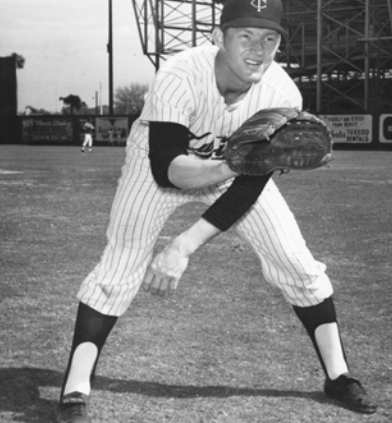Prelude to a Pennant: Twins Baseball, 1961–64
This article was written by Francis Kinlaw
This article was published in The National Pastime: Baseball in the Land of 10,000 Lakes (2024)
When the Washington Senators moved to a Minnesota home
As part of a league expansion plan,
Calvin Griffith’s club hoped to be greeted with warmth
In a new and fertile land.
The 1960 season, the last in Senators garb,
Closed the book on a long Washington stay;
After a fifth-place finish and 81 lost games,
Came news they were moving away.
So they went west with some promising stars:
Killebrew, Allison, and Pascual were on that list;
Promises were made to improve a ballpark
With more seats guaranteed to exist.
The first Minnesota season began with great joy:
Pedro Ramos blanked the Yanks with a three-hitter;
The home opener soon returned expectations to earth,
Losing to the “new Nats” made folks reconsider.
But the Twins won nine of their first dozen games,
Before a long losing streak took its toll;
Cookie Lavagetto lost his job as the skipper in charge
And coach Sam Mele inherited that role.
A seventh-place finish in a ten-team league
Satisfied few who had cheered for the team;
Fielding, baserunning, and hitting were weak
But the attendance fulfilled Griffith’s dream.
The situation improved greatly in 1962,
As the list of stars grew longer;
Earl Battey was reliable behind the plate;
Acquiring Vic Power made the club stronger.
Dick Stigman came along in the same trade as Power,
To join these stars and Jim Kaat;
With Rich Rollins and Bernie Allen in the process of jelling,
The Twins rose to the runner-up spot.
A highlight that season took place in late August
When Jack Kralick threw the Twins’ first no-hitter;
The lowly A’s were the hurler’s unfortunate foe,
But that diminished neither the feat nor the glitter.
The team fell to third place in 1963,
Having dropped to the cellar in May;
Poor weather and rainouts washed out many days:
The team’s outlook—like the climate—seemed gray.
But the club rebounded with a second-half spurt
Behind big names and a surprise—Jimmie Hall;
Pascual pitched heroically though his shoulder was bad,,
As Twins hitters launched balls over walls.
The 1964 season began with concerns:
Neither Pascual nor Stigman kept fans enthused;
Reliever Bill Dailey hurt his arm (he was never the same),
Fielders committed too many miscues.
The Twins fell out of the race with a disastrous July,
Having lost 18 of 29 games;
When they finished sixth with a losing mark,
Griffith’s temper became truly inflamed!
There were positive signs: Tony Oliva hit the big time
And as a rookie captured the league’s batting crown;
Klippstein and Worthington relieved after being bought with cash,
“Mudcat” Grant’s arrival made batters frown.
But out of disappointment, the stage was now set
For a summer of memories and more;
After four years of hoping, a pennant did fly
And crowds in Met Stadium did roar!
Mele’s gang achieved much in 1965,
Though two Koufax shutouts tempered the mood;
Progress that occurred in just a few years,
Changed how the franchise was viewed.
Nearly six decades later, the club’s history is rich
With memories of games and events;
In three local venues, fans have confirmed
That they’ve enjoyed hours well-spent.
Names of players, especially those of the stars,
Stir up memories anew:
Jim Perry and Viola, Puckett and Mauer
Blyleven and Hrbek and Carew.
More thrills are almost surely in store
For young patrons drawn to Twins games;
But their experiences are unlikely to ever surpass
Memories their elders retain.
FRANCIS KINLAW has been a member of SABR since 1983. He resides in Greensboro, North Carolina, and has contributed numerous articles to the Baseball Research Journal, The National Pastime, Turnstyle: The SABR Journal of the Baseball Arts, and several other SABR publications. As a Southerner and a high school and college student in the Tar Heel State, he followed the ascent of the Twins in the early 1960s with vivid memories of the franchise’s bleak final decade in Washington.




